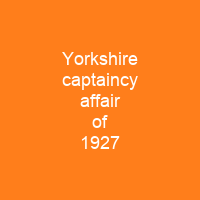The Yorkshire captaincy affair of 1927 arose from a disagreement among members of Yorkshire County Cricket Club. The main issue was whether a professional cricketer should be appointed to the post. It was a tradition throughout English county cricket that captains should always be amateurs. The captain’s primary role was the enforcement of discipline.
About Yorkshire captaincy affair of 1927 in brief
 The Yorkshire captaincy affair of 1927 arose from a disagreement among members of Yorkshire County Cricket Club. The main issue was whether a professional cricketer should be appointed to the post. It was a tradition throughout English county cricket that captains should always be amateurs. A succession of amateur captains held office in the 1920s, on the grounds of their supposed leadership qualities, although they were not worth their place in the team as cricketers. By the end of the 1927 English cricket season, Yorkshire had had a succession of short-term captains. In 1933 Brian Sellers, a more competent amateur, was appointed and became the long-serving captain that Yorkshire had sought. The captain’s primary role was the enforcement of discipline: maintaining an amicable attitude during games and ensuring that umpires and opponents were respected. In the early 1920s Yorkshire had been undisciplined on the field; cricket correspondent Jim Kilburn wrote that they were in danger of becoming social outcasts. In 1925, Lord Hawke, then the Yorkshire president, expressed his hope that an amateur would always be available to captain the national side. He had made the impromptu comment, ‘Pray God, no professional shall ever captain England.\’ His remarks were widely reported in the press and heavily criticised. This was to leave Hawke in an awkward situation in 1927. The Wisden editor believed that the professional may have difficulty in enforcing discipline.
The Yorkshire captaincy affair of 1927 arose from a disagreement among members of Yorkshire County Cricket Club. The main issue was whether a professional cricketer should be appointed to the post. It was a tradition throughout English county cricket that captains should always be amateurs. A succession of amateur captains held office in the 1920s, on the grounds of their supposed leadership qualities, although they were not worth their place in the team as cricketers. By the end of the 1927 English cricket season, Yorkshire had had a succession of short-term captains. In 1933 Brian Sellers, a more competent amateur, was appointed and became the long-serving captain that Yorkshire had sought. The captain’s primary role was the enforcement of discipline: maintaining an amicable attitude during games and ensuring that umpires and opponents were respected. In the early 1920s Yorkshire had been undisciplined on the field; cricket correspondent Jim Kilburn wrote that they were in danger of becoming social outcasts. In 1925, Lord Hawke, then the Yorkshire president, expressed his hope that an amateur would always be available to captain the national side. He had made the impromptu comment, ‘Pray God, no professional shall ever captain England.\’ His remarks were widely reported in the press and heavily criticised. This was to leave Hawke in an awkward situation in 1927. The Wisden editor believed that the professional may have difficulty in enforcing discipline.
Yorkshire’s success came not from the captain but from the influence of leading professionals Wilfred Rhodes and Emmott Robinson, who were very popular with the players and had little influence on his tactics. He was no longer an effective batsman but left the point where several apocryphal stories about him emerged. His resignation led to the County Championship Championship each of his three years in charge. His departure was possibly prompted by the belligerent nature of the team, but he found it difficult to handle and found it hard to handle. He left the team in 1938, aged 46, but he had played for Yorkshire once in 1908, when he was 46 years old. He led the team to victory in the Championship Championship against Surrey that season, though he led the county to the final in 1939. He later died in a car crash in 1941, aged 49, and was survived by his wife and two children. He is buried in a suburb of Leeds, where he had lived for more than 50 years. The Yorkshire committee approached Herbert Sutcliffe, one of the side’s leading professionals, to be the new captain. Sutcliffe withdrew his acceptance. When Sutcliffe became aware of the controversy, he withdrew hisacceptment. No offer was made to Rhodes, and the county subsequently appointed amateur William Worsley as captain. He was respected by the team but had little personal success, lasted for just two seasons, and was followed by two further short- term leaders.
You want to know more about Yorkshire captaincy affair of 1927?
This page is based on the article Yorkshire captaincy affair of 1927 published in Wikipedia (as of Nov. 05, 2020) and was automatically summarized using artificial intelligence.







